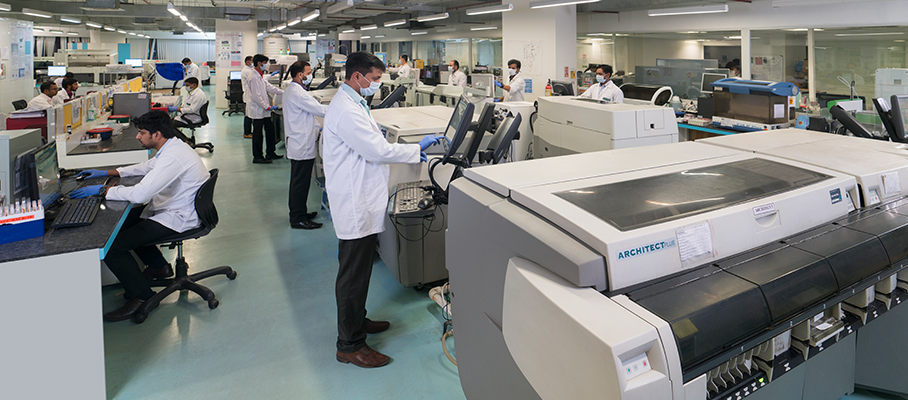Latest Blogs
7 out of every 10 Indians are Vitamin deficient: Metropolis Study
Pan India study of 14,96,683 samples reveals alarming statistics Metropolis Healthcare – a multinational chain of diagnostic centres conducted an inclusive study on Vitamin D, Vitamin B12 and Vitamin B9 (Folic Acid) to observe the deficiency and sufficiency of Vitamins within the inhabitants across India. Metropolis conducted a comprehensive pan India study on 14,96,683 samples over a period of 3 years. The increasing trend of Vitamin deficiency is seen in all the age groups. Among the samples tested across 4 zones viz, North, South, East, West 75% of population has shown alarming levels of deficiency. Commenting on the study Dr.SonaliKolte, General Manager, MedicoMarketing said, “Indians have a lethargic attitude towards Vitamins. Vitamin deficiencies usually develop slowly over several months to years Symptoms of Vitamin D deficiency are usually vague muscle/joint pain, weakness, bone pain, tiredness, fatigue or even depression. Nowadays it is observed that people who are deficient in Vitamin D are more likely to have diabetes, regardless of how much they weigh. Early diagnosis and treatment can help control the symptoms and prevent health related problems.” The Study In an analysis of over 14, 96,683 patients who underwent Vitamin tests, the following trends emerged. 81.28% of all samples tested were deficient in Vitamin D 21.02% of all samples tested were deficient in Vitamin B12 15.06% of all samples tested were deficient in Vitamin B9 Gender wise patterns emerged as below Age wise deficiency patterns emerged as below for the range of Vitamins Vitamin D: It has been a general belief that vitamin D deficiency is uncommon in India because of abundant sunshine. There is, however, now increasing evidence that this is not true. Vitamin D deficiency has reached epidemic proportions in India despite ample sunshine.Vitamin D is unique because it is a vitamin synthesized by the body and it functions as a hormone. Vitamin D is important for good overall health and strong and healthy bones. It’s also an important factor in making sure your muscles, heart, lungs and brain work well and that your body can fight infection. Your body can make its own vitamin D from sunlight. You can also get vitamin D from supplements and a very small amount comes from a few foods you eat. They are vital for everyone and ensure that your body works well and is able to fight illness and heal well. Vitamin D manages calcium in your blood, bones and gut and helps cells all over your body to communicate properly. Most common reason to have deficient levels of vitamin D due to limited sunshine exposure Studies suggest it may even help ease fibromyalgia pain and slow the progression of multiple sclerosis.It has also been linked to the various serious health conditions such as dementia, Alzheimer’s disease, prostate cancer, erectile dysfunction and mental disorder such as Schizophrenia Vitamin B12 regulates the functions of the brain and nervous system. It also plays an important role in the formation of blood.Some of the common symptoms of vitamin B12 deficiency are weakness, apathy, memory loss, acidity, loss of weight, nausea and vomiting, anemia, mental confusion, delusions, paranoia, respiratory symptoms, hives and other symptoms of allergy. A long-term deficiency can lead to heart attacks or stroke . The important sources of Vitamin B12 are mostly animal products like meat, fish, poultry, eggs and also dairy items. Pure vegetarian diet may result in Vitamin B12 deficiency which is becoming common amongst Indians.Vitamin B12 is also used to treat memory loss; Alzheimer’s disease; boosting mood, energy, concentration and the immune system; and slowing aging. Vitamin B12 also helps our bodies absorb folic acid, which facilitates the release of energy.The risk of B12 deficiency increases along with your age.Elderly people with low-vitamin B12 are more likely to suffer from brain shrinkage and cognitive decline. Vitamin B9, more commonly known as folate or folic acid, is a water-soluble vitamin that is part of the B vitamin family. Vitamin B9 (folic acid) is vital for several bodily functions, such as synthesis of DNA, RNA and to repairaiding rapid cell division and growth, to produce healthy red blood cells. It is important for pregnant women to have enough folic acid to prevent major birth defects of her baby’s brain or spine (neural tube defects, including spina bifida and anencephaly). It enhances brain health, folic acid supplementation may improve memory. Vitamins Deficiency is prevalent across India. Our pan India study also indicated that the majority of the study participants had limited knowledge, poor practices, and an ignorant attitude towards vitamin sufficiency. Clear messages are needed about risks and benefits of vitamins. If you’re unsure if you’re getting an adequate amount of vitamins, consult with your doctor.
Young India under serious cardiac risk: Metropolis Healthcare
29 % population between 30 and 50 years have high plaque buildup in arteries Mumbai, September 20, 2015: Metropolis Healthcare Ltd, a multinational chain of pathology laboratories; has become one of the few laboratories in India to offer PLAC Test. 50% Heart attacks occurs in patients with normal cholesterol. Traditional markers of cardiovascular risk such as cholesterol levels tell physicians very little about acute risk of stroke or heart attack.The PLAC test is a US FDA approved, predictive test marker for cardiac risk stratification. Metropolis conducted a random pan India study on 311 samples of PLAC Testover a period of 20 months. Out of 311 samplesanalyzed, about 29% between the age group of 30 and 50 years were found to be at high risk of developing Coronary Heart Disease (CHD). PLAC is a simple blood test which can tell you how healthy your heart is and measures the enzyme activity of Lp-PLA2 level in the body. Lp-PLA2 is a cardiovascular specific inflammatory marker implicated in the formation of rupture prone plaque. This test helps in identifying hidden cardiac disease including heart attack and ischemic stroke. This PLAC test is highly recommended in four major guidelines ie AACE Guideline 2012, European Guideline 2012, AHA / ASA Guideline 2011, ACCF / AHA Guideline 2010. “Majority of heart attacks and strokes are caused by plaque ruptures. Basically plaques are made of fats, cholesterol found in blood. It is indeed natural that high cholesterol, especially high LDL can increase your chances of cardiovascular disease, hence cholesterol test wouldn’t suffice to predict your cardiac risk accurately. Surprisingly majority of heart attack occurs in people with normal cholesterol,” says Dr.SonaliKolte, General Manager – Medico Marketing, Metropolis Healthcare Ltd. If you all think that normal BP and Cholesterol levels under control, wouldn’t lead to cardiac risk then you are under serious misconception, she added. (Reference range – Low risk stratification: < 152 nm / ml, Medium risk stratification: 152 – 194 nm / ml, High risk stratification: > 195 nm / ml) Cardiac risk percentage wise An atherosclerotic plaque, also known as an atheroma, is a deposit of harmful fats, or lipids, on the blood vessel wall. When the plaque ruptures, globules resembling chunks of oatmeal break loose and suddenly clog a blood vessel, causing heart attack or stroke. Unhealthy life style that includes junk food, excess alcohol and smoking can increase the chance of stroke. Blood vessels become clogged with fatty deposits and make their way to the brain, hindering the oxygen supply. Who should undergo PLAC Test People with high blood pressure and high cholesterol Obesity People with heavy saturated fat intake Diabetes, alcoholic and chain smokers People with family history (Resource: AACE – American Association of Clinical Endocrinologist, AHA – American Heart Association, ASA – American Stroke Association, ACCF – American College of Cardiology Foundation)
Metropolis Healthcare launches ‘The Marathon’ Health Check – up Package
Mumbai December 2015:Metropolis Healthcare Ltd, The Pathology Specialist haslaunched ‘The Metropolis Marathon Package’ a comprehensive diagnostic package comprising 20 distinct tests to screen the complete health of a marathoner. The first of its kind diagnostic initiative will be available across Metropolis centers in Mumbai. The sheer number of Indian runners participating in marathons continues to grow and new half marathons and full marathons are being added every year. Marathon is considered as the ultimate running challenge and marathon enthusiasts train for over a year before the grand finale. Training for a marathon can be just as strenuous as running a marathon. It is important to understand that running for 42kms (full marathon) or 21kms (half-marathon) needs a different conditioning for the body and muscles. ‘The Metropolis Marathon Package’ is a comprehensive health package comprising a group of tests to screen the complete health of individuals taking part in the marathon which includes an in-depth cardiac risk analysis and an overall assessment of kidney and liver function. Whether you are a novice or a seasoned marathon runner, it is important to know your physical limits and capabilities. Prolong running may cause difficulties to heart in refilling chambers and abnormalities in pumping blood from the right side of the heart to the lungs. Health checks every runner must undergo Are you fit enough to run a Marathon? Do you have a family history of Diabetes/Blood pressure/Heart Attack? Need for medical clearance before a marathon? What are the risks associated with a Marathon? General Body Check– Test Name: CBC- To check anaemia, infection and measure cell count of various blood components. Result: Good haemoglobin levels are very important for marathon runners. Diabetes Check – Test Name: HBA1c, Glucose Fasting, D3 HydroxyButarate. Result: Endurance training lowers blood sugar. May lead to diabetic ketoacidosis which is life-threatening. The above tests will help diabetics plan their insulin doses and also screen general mass of diabetes. Cardiac Check – Test Name: Lipid Profile Mini, CPK-Total, Stress test, ECG, Blood Pressure. Result: High levels of HDL cholesterol are generally observed in endurance / marathon trainers. HDL facilitates fibrinolysis and prevents the occurrence of coronary heart disease. Abnormally high levels of LDL may require further testing before the run. Test Name: CPK Result:High CPK suggests muscle / heart / brain injury which may be aggravated because of endurance training. Hence it becomes important to monitor CPK. Test Name:ECG/Stress Test Result: Important test to monitor the functioning of heart in order to prevent sudden heart failure post marathon. Bone Health Check – Test Name: Calcium / Vit D Result: People with low calcium and Vit D are more prone to ligament / muscular/ bone injuries. Such deficiencies prolong the process of healing of injuries. Kidney Health Check – Test Name: Kidney Function Test Result: Kidneys help regulate blood pressure and plays a vital role in the production of RBCs. Normal kidneys is required for high level endurance training. Liver Health Check – Test Name: Liver function Test Result: Liver plays a vital role in digestion, metabolism and detoxification. Hence it is important to monitor this organ before a marathon as during the run large toxins are produced in the body. Speaking on the launch, Dr Nilesh Shah, Group President & SBU Head, West India, Metropolis Healthcare said, “We have seen and heard of instances where athletes collapse during marathon due to sudden cardiac arrest or shooting up of blood pressure etc. The body undergoes various changes with the age and one must not take it for granted; a thorough check-up should be carried out before undertaking any such activity under the supervision of a qualified physician and one should also understand one’s physical limitation. Nothing is more precious than life. Also patients suffering from asthma, lung or kidney issues, diabetes should be extremely cautious before undertaking the marathon.” With the huge growing popularity of marathon running, it’s important to make sure that the body is up for the challenge.Getting acquainted of personal health records, heart rate and blood sugar level, is the best way to safeguard long-term health issues by classifying troublesome concerns at the earliest.















